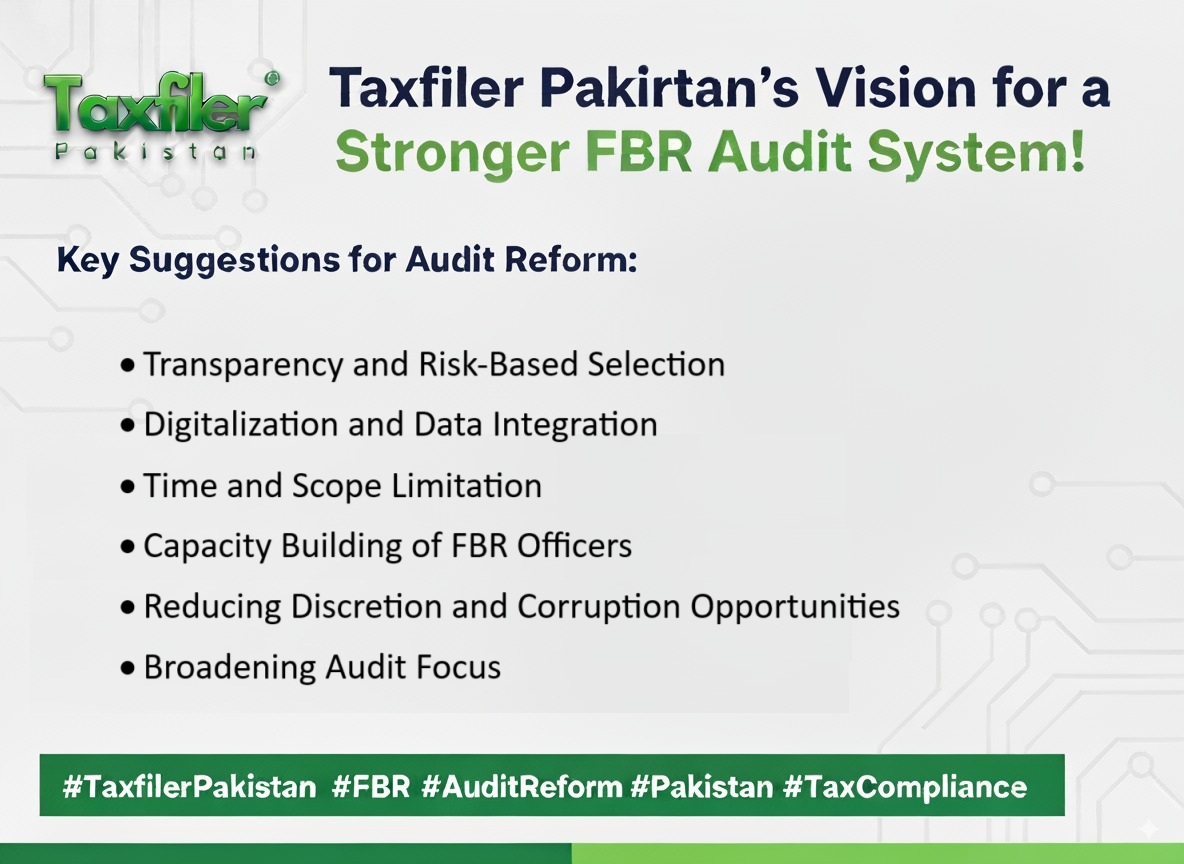
Implemention of key factors can turn the table:

Audit System Suggestions for Federal Board of Revenue (FBR)
Background
The Federal Board of Revenue (FBR) plays a crucial role in ensuring tax compliance and revenue collection in Pakistan. However, the existing audit system has faced persistent criticism from taxpayers and experts for its limited transparency, excessive discretion, lengthy procedures, and weak enforcement capacity. These challenges not only reduce the effectiveness of tax audits but also undermine taxpayer confidence in the overall system.
To address these issues, this note outlines key reforms aimed at enhancing transparency, efficiency, and fairness in FBR’s audit framework.
Policy Recommendations
1. Transparency and Risk-Based Selection
Adopt a risk-based audit selection mechanism that relies on objective parameters such as sectoral risk, turnover anomalies, expense-to-revenue ratios, withholding mismatches, and compliance history.
Publish broad audit selection criteria to ensure taxpayers understand the basis of selection and reduce perceptions of arbitrary targeting.
2. Digitalization and Data Integration
Fully integrate databases of FBR, NADRA, SECP, provincial revenue authorities, banks, and property registries for automated cross-verification.
Introduce AI-driven analytics to detect mismatches between declared income, lifestyle, and third-party data.
Shift towards e-audit portals to minimize physical interactions and reduce opportunities for harassment & corruption.
3. Time and Scope Limitation
Define statutory timelines for audit completion (e.g., maximum number of days to conclude).
Limit audits to specific issues or years identified during risk assessment rather than opening multiple tax years simultaneously.
4. Capacity Building of FBR Officers
Provide continuous training in international auditing standards, forensic accounting, and sector-specific taxation.
Establish performance-based evaluations for officers, linking career growth to quality of audit outcomes rather than revenue demand alone.
5. Reducing Discretion and Corruption Opportunities
Implement centralized system-based allocation of audit cases to prevent officer-level discretion.
Introduce internal peer review mechanisms using AI before finalizing audit orders to enhance credibility.
6. Taxpayer Facilitation
Establish a pre-audit reconciliation mechanism to allow taxpayers to voluntarily correct discrepancies before formal audit proceedings begin.
Develop an online audit tracking system enabling taxpayers to monitor progress transparently.
Create an independent grievance redressal mechanism for taxpayers to report misconduct or undue pressure during audits.
7. Broadening Audit Focus
Rebalance audit efforts by shifting focus from already compliant taxpayers to:
Non-filers and under-reporters identified through data mismatch.
High-risk sectors such as real estate, wholesale/retail trade, imports, and service industries with significant undocumented transactions.
Expected Outcomes
Improved taxpayer confidence in the fairness of FBR’s audit system.
Enhanced efficiency and reduced litigation through structured and time-bound audits.
Broader tax base by targeting non-compliant and high-risk taxpayers.
Strengthened institutional credibility of FBR through transparency and reduced discretion.
Conclusion:
A modern, transparent, and technology-driven audit system is essential for Pakistan’s fiscal sustainability. By adopting the above recommendations, FBR can significantly improve compliance, reduce corruption risks, and build a culture of trust between taxpayers and the state.
Let Taxfiler Pakistan team know if you need further clarification or assistance!
Disclaimer:
The sole purpose of this blog is education and awareness of readers and should not be considered as professional advice in any way.
